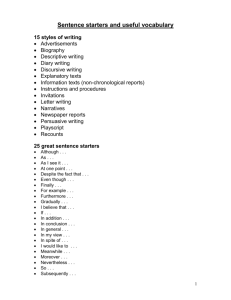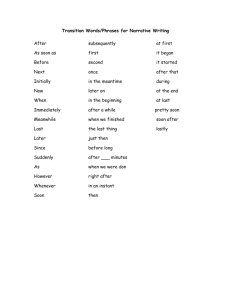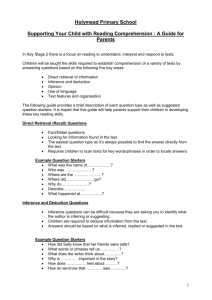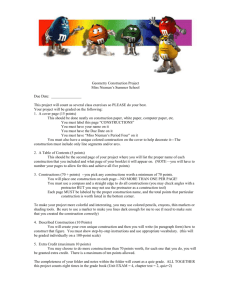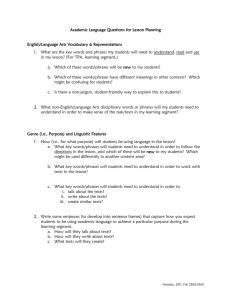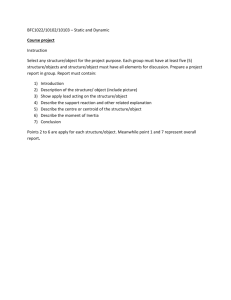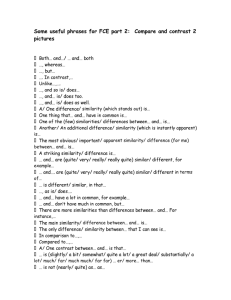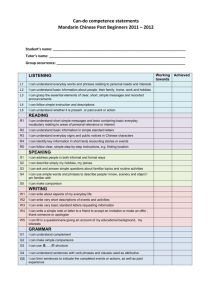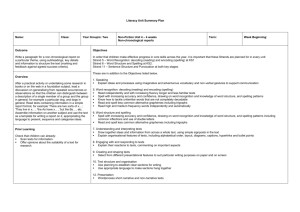Sentence starters for Key Stage 1
advertisement
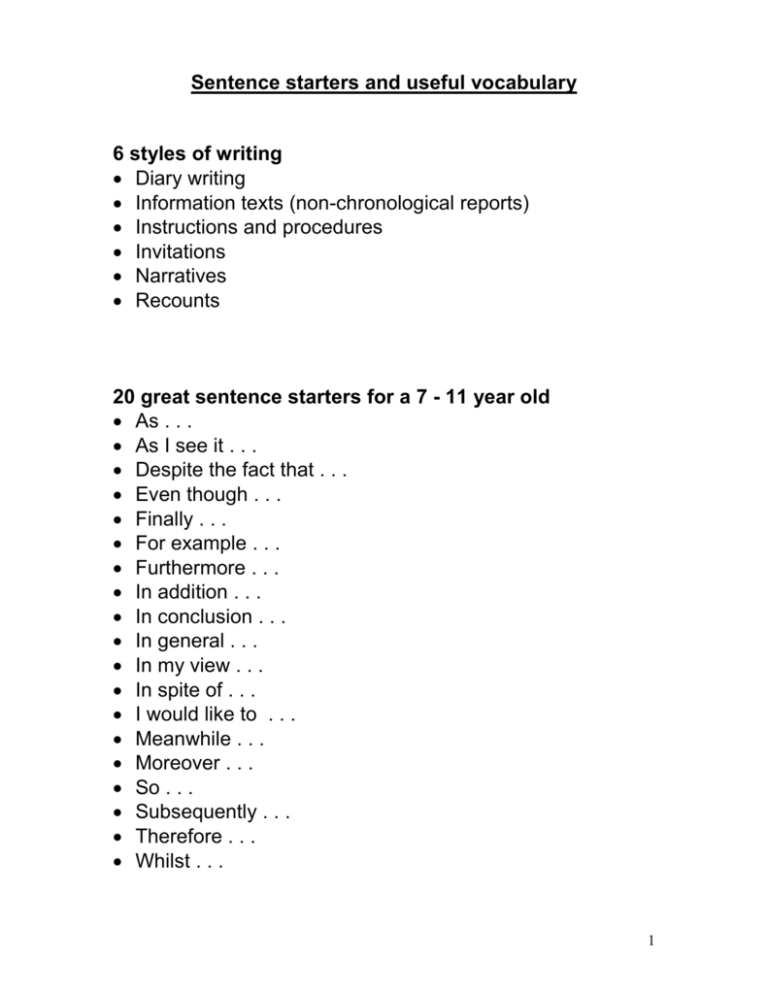
Sentence starters and useful vocabulary 6 styles of writing Diary writing Information texts (non-chronological reports) Instructions and procedures Invitations Narratives Recounts 20 great sentence starters for a 7 - 11 year old As . . . As I see it . . . Despite the fact that . . . Even though . . . Finally . . . For example . . . Furthermore . . . In addition . . . In conclusion . . . In general . . . In my view . . . In spite of . . . I would like to . . . Meanwhile . . . Moreover . . . So . . . Subsequently . . . Therefore . . . Whilst . . . 1 1) Diary writing Some words and phrases to start a diary sentence with: Hopefully Fortunately Unfortunately Luckily Unluckily Thankfully Lately Recently For once Anyway Conversational manner with ‘speech like phrases’ By the way . . . To tell you the truth . . . I must tell you about . . . You’ll never guess what happened? Right now I’m . . . You will never believe it but . . . I hope that . . . To be honest . . . I imagine that . . . I should have told you that . . I have been looking forward to . . . I am looking forward to . . . (I am not looking forward to . .) I am worried about . . . (I am not worried about . . .) I was looking forward to . . . I expect that . . . I think that . . . I don’t expect You know what? The best bit is . . . (The best bit was . . .) The worst part is . . . (The worst part was . . .) 2 2) Information texts (non-chronological reports) Some useful sentence starters for information texts _____ are . . . _____ is . . . They are . . . They are also . . . They like to . . . They don’t like . . . They avoid . . . because . . . They don’t . . . It doesn’t . . . They can . . . It can . . . Instead they . . . In addition, . . . Usually . . . As a rule . . . They can be . . . They are usually . . . (It is usually . . .) They are rarely . . . (It is rarely . . .) They are never . . . (It is never . . .) They are a very . . . (It is a very . . . ) Like many . . . Unlike . . . This is a . . . Sometimes . . . Often . . . Frequently they . . . Be careful if you . . . More than half . . . Less than half . . . Most 3 3) Instructions and procedures First . . . First of all . .. To start with . . . Firstly . . . Next . . . After . . . Afterwards . . . After that . . . When . . . At this point . . . Lastly . . . Finally . . . More advanced language constructions To begin with . . . Begin by . . . Secondly . . . The next step is to . . . Continue by . . . Carry on . . . Do this until . . . Stop when . . . When you have done this . . . Try to . . . Try not to . .. Avoid . . . Don’t forget to . . . Be careful of . . . Don’t worry about . . . Concentrate on . . . Focus on . . . Try to make sure that . . . 4 Whatever you do, don’t . . . I would suggest that . . . To conclude . . . Before . . . remember to . . . Whilst you are . . . Use the time you are waiting to . . . 4) Invitations Polite directives Please come to . . . It will be . . . It will take place at . . . It starts at . . . It finishes at . . . I am having a party because . . . I’m looking forward to . . . More advanced language constructions I would like to invite you to . . . During the afternoon we will be . . . At two O’ clock there will be . . . There will also be . . . The easiest way to get here is . . . At around . . . I think that . . I expect that . . . The thing I am looking forward to most is . . . If you would like you can . . . It would be good if . . . I hope that you will . . . Try to/try not to . . . Don’t forget to . . . If it’s okay with you . . . If you can remember to . . . 5 Ten time connectives First of all Later Afterwards After that Next, we will . . . Soon after At about . . . Following that Finally At the end of the afternoon/evening 5) Narratives Words/phrases signifying the passage of time Instantly Immediately Just at that moment Before long So Presently Soon Later Afterwards After a while Much later At last Next day The next evening Eventually Towards nightfall At dawn At dusk As the sun set 6 Simultaneously Finally Words/phrases to change the focus of the story Suddenly Meanwhile Not far away Some distance away While During 6) Recounts Useful language constructions Last week we . . . First . . . Next . . . After . . . Afterwards . . . After that . . . When . . . Suddenly . . . Just then . . Soon . . . Meanwhile . . . Finally . . . So Later on Before long Next Moments later Seconds later Much later Within minutes At that very moment 7 At precisely Presently In a flash When this was complete . . . Eventually More advanced language constructions To begin with . . . Before long . . . Eventually . . . As it happened . . As a result of . . . Consequently . . . Subsequently . . . Evidence of viewpoint I found it interesting when . . . My favourite activity was . . . It was funny when . . . I liked the part when . . . I didn’t enjoy . . . The best part was . . . The worst part was . . . I was surprised that . . . I was pleased that . . . I didn’t expect that . . . It was difficult to . . . 8
